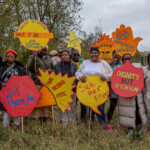“This report demonstrates, however, that there is a disparity between Home Office policy guidelines and what is actually happening in practice”.
Hands up who’s heard that one before.
The line comes from a June 2016 report from the All Party Parliamentary Group (APPG) for International Freedom of Religion or Belief – ‘Fleeing persecution: Asylum Claims in the UK on Religious Freedom Grounds’. You can find the report here.
The report details the ways in which those claiming asylum in the UK, on the basis of religion (or lack of it) face many barriers to establishing their need to protection. While some of the issues raised are specific to religion-based claims, many will be familiar to those claiming asylum for any reason, and those supporting them. The report makes clear the systematic defects of the asylum system, and reveals the culture of disbelief that means the odds are stacked against an asylum-seeker seeking protection here.
As was reported in the Christian Post a couple of weeks ago, the Home Office are now embarking on training to improve the interviewing and decision-making on religion-based asylum claims. While this positive response to the APPG’s finding is to be welcomed, veterans of the UK’s asylum process will know that training in itself is not enough. All too often, we encounter examples of the Home Office not following its own policy and guidelines.
This blog post will highlight some of the many issues faced by people seeking asylum on the basis of religion/belief, or lack of it. It’s important to know what Home Office policy is and how it should be applied, and the failure to follow Home Office policy or guidelines may be important in challenging a refusal in your case or the case of someone you are supporting.
Claiming asylum on religious grounds
To be granted asylum (to get refugee status) under the Refugee Convention, it’s necessary to show that you have a well-founded fear of persecution for reasons of race, religion, nationality, political opinion or membership of a particular social group.
You also have to be you outside your country of origin or normal residence, and unable to get protection in your own country.
Persecution, in terms of claiming asylum, is serious, targeted mistreatment of an individual because of who they are, or what they do, or what people think they are or do.
In the context of religion/belief based asylum claims, persecution could include forced conversion; prohibition of membership of a religion community, or worship in community with others in public or private, or religious instruction; or serious measures of discrimination imposed on individuals because they practice religion, belong to or are identified with a particular religious community, or have changed their faith.
Read the UNHCR guidelines on Religion-Based Refugee Claims here
The APPG report points out that although religion is a clear ground for asylum (as mentioned above), there is no definition of religion under international law or refugee law.
The Qualification Directive is the interpretation of the Refugee Convention in European Law of the Refugee Convention in EU, and therefore UK, law. (Although the status of EU directives in UK law after the UK leaves the EU is not yet known, most recent indications suggest these directives will still apply in the UK). The Directive describes religion as a ground of persecution:
“the concept of religion shall in particular include the holding of theistic, non-theistic and atheistic beliefs, the participation in, or abstention from, formal worship in private or in public, either alone or in community with others, other religious acts or expressions of view, or forms of personal or communal conduct based on or mandated by any religious belief”.
Risk of persecution because of religion might manifest in politics as well – for example, if those in power in a country are of a particular religion and the asylum seeker is of another. Someone facing persecution in this situation may have grounds for an asylum claim under both religion and political belief.
Imputed belief could also mean that someone is risk of persecution.
From Right to Remain Toolkit section on imputed identity or beliefs
“Imputed” identity or beliefs means what people think you are or do. What people think you are, or do, could put you at risk of persecution even if it’s not true.For example, if your local community thinks or says you are a Christian or an atheist, this may put you in danger even if you are not actually a Christian or atheist. If your family and neighbours believe you are gay or lesbian, you might be at risk irrespective of whether you are gay or straight. You may not actually be a member of an at-risk political group, but someone might spread rumours that you are, to try and get you in trouble.
Imputed beliefs might be a factor if a family member or friend is politically active or a member of a religious minority, and it is assumed you also hold these beliefs (this often applies to women asylum applicants). It may be because you are a gay rights campaigner, and therefore would be at risk in a homophobic country because people assume you are gay. Or it may be that because of your lifestyle (for example, you are unmarried in a country/culture where this is unusual) people assume you are gay and you would be at risk of persecution because of that.
Imputed beliefs may be assumed because of where you live, the job you do, and many other things outside of your control.
Risk of persecution because of atheism (or imputed atheism), that is not having religion or belief, can also be considered under the ‘religion’ grounds of the Refugee Convention. This was established by an important legal case fought by Kent Law Clinic, on behalf of an Afghan asylum seeker. You can read about the case here.
Credibility
Lack of credibility is the main reason that asylum claims are refused by the Home Office.
This means that the Home Office does not believe you have a well-founded fear of persecution – either because they don’t believe you are telling the truth about what has happened in the past, or that you are not really a member of a category of people that has been proved to be likely to face persecution.
You can read Amnesty International’s 2013 report on credibility in asylum cases here. The Home Office’s Asylum Policy Instruction on assessing credibility can be found here.
At the point of the asylum (“substantive”) interview, many asylum seekers will not have documentary evidence to demonstrate that they are likely to face persecution if they are returned. This means that what you say in the asylum interview – your testimony – will be compared to what you said in your screening interview, and compared to independent evidence about the situation in your country. The Home Office decision-maker will then decide if they believe you, and whether you need protection in the UK.
Even if you are able to source documentary evidence later in your case, if the Home Office (and maybe the courts) have found you to be ‘incredible’ already, it is harder to win your case.
Knowledge testing
In the inquiry that led to the APPG report, evidence submitted showed a clear pattern of the Home Office using knowledge testing in the asylum interview. This is despite Home Office and UNHCR guidelines warning against assessing credibility on this basis. The report highlights that a more reliable way of assessing credibility would be to establish the “personal narrative of the applicant, including their feelings and experience of their religious faith”.
As the report points out on the matter of Christian conversion cases:
“Given that conversion to Christianity from other religions is often a very complicated and burdensome process, frequently leading to an ostracisation from their family and local community, expecting a convert to have the same knowledge as an individual even born into a Christian family is illogical”.
Problems around knowledge testing to assess the credibility of Christian converts has long been documented, as in this 2007 Evangelical Alliance report, with little progress made on changing Home Office behaviour.
The Home Office Asylum Policy Instruction on Asylum Interviews does not prohibit religious knowledge testing – it limits it to “more educated applicants” and says questions must be carefully prepared, and not expect an unrealistic level of specialist knowledge.
This does not appear to have been in the mind of the Home Office interviewer who asked one Christian asylum-seeker, in evidence cited in the APPG report, “How many chapters are there in the book of John?”.
Examples of “Bible trivia” questions are not hard to find. The BBC coverage of the release of the report, back in June, featured the story of Mohammed, an Iranian convert to Christianity who described what happened in his asylum interview:
“One question they asked me was very strange – what colour was the cover of the Bible,” he says. “I knew there were different colours. The one I had was red. They asked me questions I was not able to answer – for example, what are the Ten Commandments. I could not name them all from memory.”
Testing someone’s faith is inherently fraught and unreliable, even more so if reduced to factual matters that may bear no relation to the level of someone’s faith or belief, or risk for holding that belief.
Refusals of claims
While the knowledge testing of asylum applicants has been shown to be dubious, the level of knowledge of Home Office decision-makers is also rather questionable.
The Home Office interviewing officers will need to check the testimony given by the asylum seeker against independent, objective evidence. The APPG report refers to those officers checking an applicant’s knowledge of churches and liturgies against a quick survey of church websites, which may have limited or incorrect information:
“In one case, Ms Fard outlines that the Home Office caseworker had not realised that an Anglican Church can also be an Evangelical one and thus found the applicant’s testimony inconsistent”.
The Immigration Law Practitioners’ Association (ILPA) submitted evidence to the inquiry, raising concerns about the formalisation of such ignorance:
“We are concerned that, all too frequently, first-instance decision making appears to be premised upon staff who are using unpublished ‘crib’ sheets and/or who have adopted a fixed view of the precepts of particular religions. This problem has also infected tribunal decision-making in some instances. The problem can work both ways: persons seeking asylum have both been rejected on grounds that they do not adhere to a particular religion if answers are apparently inconsistent with the crib sheet, or in some cases disbelieved where they give answers that are entirely consistent on the basis that they have merely been told what to say.” that HO – interviewing policy. crib sheets.
The Home Office told her that “as there was no evidence about atheism in Sudan, it could be concluded that there are no atheists in the country and that therefore she could not possibly have been persecuted for this reason”.
Failed by the system
Unfortunately, these problems are not limited to Home Office decision-makers. The report gives many examples of extremely concerning behaviour and decisions by immigration judges at the Tribunal, and the negative role that interpretation can play.
One example given is an appeal refused by an immigration judge, who remarked that the Catholic applicant’s ignorance of the Friday abstinence rules in Catholicism (refraining from eating meat) meant he was clearly not a Christian. This is despite the fact that the asylum-seeker was from India, where meat is commonly eaten on Fridays even by the most devout Catholics.
An Ahmadi man seeking asylum on the grounds of his persecution in Pakistan was questioned by a judge in his appeal at the First-tier Tribunal, and told he could only answer questions in yes or no fashion, not allowing him to give examples or details.
ILPA identified a case involving a Sudanese political activist who had become a member of the Sudanese Communist Party. The judge rejected his appeal on the basis that his views did not accord with Marxist doctrine, that is, they did not believe he could be a Marxist while still regarding himself as a Muslim!
Home Office policy (see here, paragraph 5.5) states that Home Office interviewers are required to check with interpreters before the start of the asylum interview that the interpreter has an understanding of the religious terminology they will need to conduct the interview. The interviewer should check that the questions prepared for the asylum applicant can be interpreted/translated accurately.
The report cites numerous cases in which it was clear this procedure had not been followed, and poor interpretation had directly led to the asylum claim being refused.
One particularly troubling example is given in the report, where the asylum seeker is let down by both the judge and the interpreter, and also the lack of legal aid representation. It’s an example that really sums up the systematic failings of the asylum system:
“Mohammad was an active house church leader in Iran. His case was refused because the Home Office did not believe he was a Christian.
He lost his first appeal because of mis-translation of Christian terminology at the hearing. During the tribunal hearing, the judge asked him to state the name of the last book of the Bible. Mohammad responded Mokashefe, which is the Farsi word for Revelation; the Muslim interpreter repeated the same word to the Judge. The judge in his decision stated that the last book of the Bible was not Mokashefe but rather the book of Revelation.
Mohammad also did not have any lawyer and therefore could not answer all the judge’s questions promptly as he was under a lot of pressure. He won his case at the Upper Tribunal though after instructing a lawyer, having a witness and having a different interpreter.”
The barriers to proving you belong to a persecuted faith or lack a faith, are multiple. Even when asylum seekers have managed to demonstrate this, they may still face refusal, when they are (incorrectly) told they can go home and be safe by hiding their religion (or lack of religion). The landmark case of HJ (Iran) and HJ (Cameroon), a case that went to the UK Supreme Court and established it was not lawful to tell gay asylum seekers they could go back home and hide their sexuality, is applicable here. People have a right to follow the religion of their choice, and follow none, and should be able to do this openly.
According to the law, neither Home Office decision-makers nor judges should be telling asylum-seekers they do not need asylum in the UK because they can hide their belief/atheism.
An Iranian asylum-seeker quoted in the report provides a vivid evocation of the problems of the UK asylum system:
“Instead of helping to heal their trauma the system cuts open their wound and dips it into a flame before rubbing salts into it”.
















Discussion: